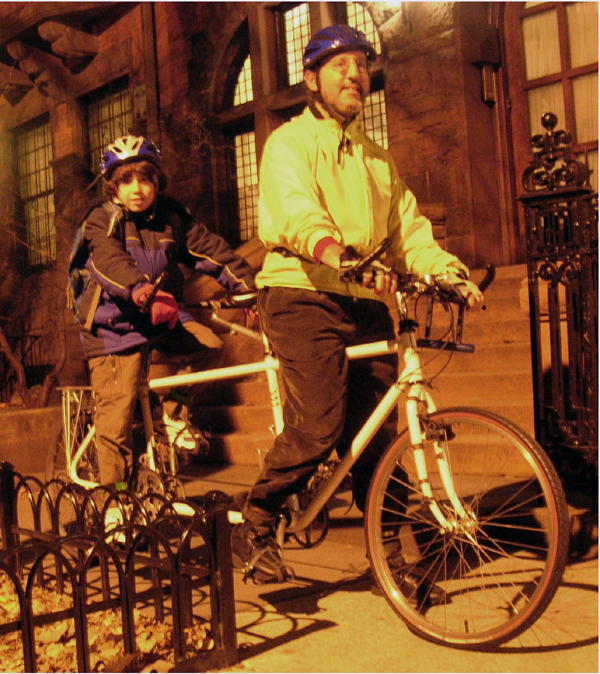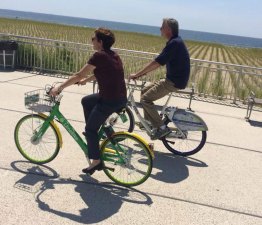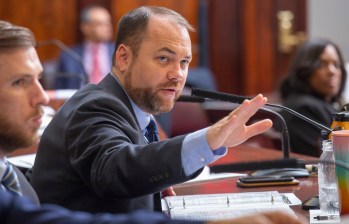KOMANOFF: Remembering Noach Dear, the Public Face of Indifference to Road Safety

My most vivid memory of Noach Dear, the state supreme court judge and former city council transportation chair who died from coronavirus on Sunday at age 66, may surprise you: he is listening closely as I lecture him — no, hector him, actually — on a subtle, but key, tenet of bicycling safety.
My message: What gives me and my young son a modicum of protection as we bike through the city is not the helmets we dutifully wear, or the police to whom you pay obeisance, but the presence on the road of other cyclists. My subtext: Don’t you dare foist a helmet law on cyclists when you and others in city government are consigning us to hellish streets and marauding drivers.
The year was 1998, the occasion was a Council hearing on a bill that would require people riding bikes in New York City to wear helmets. Surprise, surprise, Dear appeared to be actively listening to, perhaps even hearing, what I was saying. He may truly have been processing and grasping, in real time, my crude formulation of what would come to be called safety-in-numbers, that the presence of more cyclists lessens the chances that any individual cyclist will be struck by a driver; and its corollary that a compulsory-helmet law, by diminishing the number of cyclists, will worsen rather than improve safety for people like me and my son who already wear helmets when we ride.
Compounding my surprise was Dear’s public record. Throughout his long tenure on the Council, which stretched from 1983 to 2001, as he represented Midwood and parts of Borough Park and Bensonhurst, he was, as much as any elected official, the public face of hostility to cyclists and indifference to pedestrians, as city officials gave drivers carte blanche to mow down hundreds of vulnerable road users each year.

A year before the helmet-law hearing, in 1997, the pedestrian-rights group Right Of Way targeted the councilmember with a marathon street-stenciling operation. Bundled against the Thanksgiving-weekend cold, our crew of cyclists criss-crossed Dear’s district to spray-paint “Killed By Automobile” memorials to 14 pedestrians whom drivers had run over in the three prior years. As I wrote then in a Daily News op-ed (downloadable PDF or viewable here), seven of the traffic-violence victims were older than 75, among them a 95-year-old man and three women in their 80s. But there was also a teenage girl who died in 1994 when a school bus backed over her in Borough Park near the corner of 16th Avenue and 52nd Street. At nearly the same site a year later, a turning dump-truck driver ran over an 86-year-old woman crossing with the light.
Our operation that day was a unicorn for Right Of Way – not just our record 14 stencils, but weaponizing them against a particular politician. Dear richly deserved being singled out.

Not only were he and his transportation committee MIA on entrenched citywide traffic violence, Dear was also helping block a Borough Park bike lane sought by city DOT as a connector between Brooklyn’s two great bicycle boulevards: the Shore Parkway path girding the Bay Ridge waterfront and the Ocean Parkway path between Prospect Park and Coney Island.
Dear’s stated pretext, “Our narrow streets are not conducive to bike lanes,” was of course an implicit rejection of cycle lanes anywhere. His real rationale, however, was probably the earlier vote by Brooklyn’s Community Board 12 rejecting the bike lane, else “scantily clad cyclists” invade the area and affront the locals’ religious sensibilities. As I wrote in my op-ed, Dear’s stance was another way in which motorist ideology mixed with local prejudice denied pedestrians and bicyclists safe access to streets and communities.
The Borough Park lane was shelved. But so was the helmet law. Dear paid no political price for our street-memorial action, but I like to think that it was the reason he listened to my remarks at the council hearing and soon withdrew the helmet bill.
Dear retired from the City Council at the end of 2001 to begin a new career as a judge. The Times obituary last night noted that, “In pursuing his constituents’ Orthodox Jewish agenda, he opposed abortion rights and legislation to ban discrimination against gay people.” Prejudice rarely observes boundaries.


